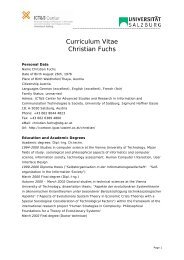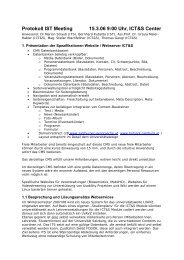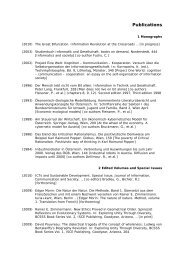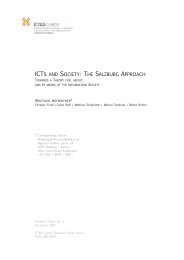CHRISTIAN FUCHS - ICT&S - Universität Salzburg
CHRISTIAN FUCHS - ICT&S - Universität Salzburg
CHRISTIAN FUCHS - ICT&S - Universität Salzburg
Create successful ePaper yourself
Turn your PDF publications into a flip-book with our unique Google optimized e-Paper software.
Christian Fuchs: Social Networking Sites and the Surveillance Societybeen approached sexually on MySpace. Therefore Marwick concludes:“Thus, I conclude that the furor over MySpace is disproportionate to the amountof harm produced by the site. Indeed, the furor over online predators seems alsoto be disproportionate. Rather than focusing on nebulous ‘predators,’ it seems thatparents, teachers, and social workers should emphasize identifying and preventingabuse in specific, local community settings. (…) while online predators do notrepresent an epidemic or socially significant problem, child pornography andchild abuse are important social issues that require attention. However, they arenot caused by minors using MySpace, and preventing children from using socialnetworking sites will do nothing to end these problems. (…) Prohibiting teensfrom using MySpace will not prevent them from using the site, and instead willdissuade them from talking about any problems that occur”.These studies show that ISNS are not a real threat for teenagers and others, and that thevictimization discourse is a construction that serves ideological purposes, i.e. thedistraction from more serious issues such as corporate interests and state surveillance, isa projection of the fears and problems of adults and of their desire to control the young,and a moral Puritanism that is anti-fun and anti-sex. Ideology in this respect means thatthere is a difference between claims (ISNS as threat) and actuality (actual degree ofabuse, threats, etc).Further examples for the techno-pessimistic victimization discourse on ISNS can begiven. This is not a complete discussion. It is only exemplary. They generally tend tostress that students put themselves at risks of stalking, sexual abuse, etc and have lowprivacy concerns and therefore make their profiles visible to the public.Frederic Stutzman (2006) conducted a survey (N=200) of students who use Facebook.He found that a “large number of students share particularly personal informationonline“ such as relationship status, location information, and political views.Nonetheless there would be a strong agreement to the statement that it is important toprotect identity information (4.21 of 5 points, 5=strongly agree).Tufekci (2008a) (N=704) reports results from a quantitative survey. 94.9% of theresponding Facebook users used their real names. 21.3% indicated their phonenumber, 12.5% their address, 46.3% their political view, 72.2% their sexualorientation, 75.6% their romantic status.“We also found that the perceived likelihood that future employers, government,corporations, or romantic partners would see their profile did not have an impacton the visibility of their profiles. The students also did not find any of thosescenarios very likely, except for future romantic partners. (…) As in previousresearch, we found that general privacy concerns were not of much relevance tostudents’ decisions regarding disclosure” (Tufekci 2008a: 31ff).Tufekci (2008b) conducted qualitative focus group interviews with 51 SNS users and aquantitative survey (N=713). “The most significant predictor of SNS use in the logisticmodels, besides gender, was the tendency to use the Internet for expressive purposes:reading blogs, creating web pages, emailing, etc.“ (Tufekci 2008b: 560). The author15









